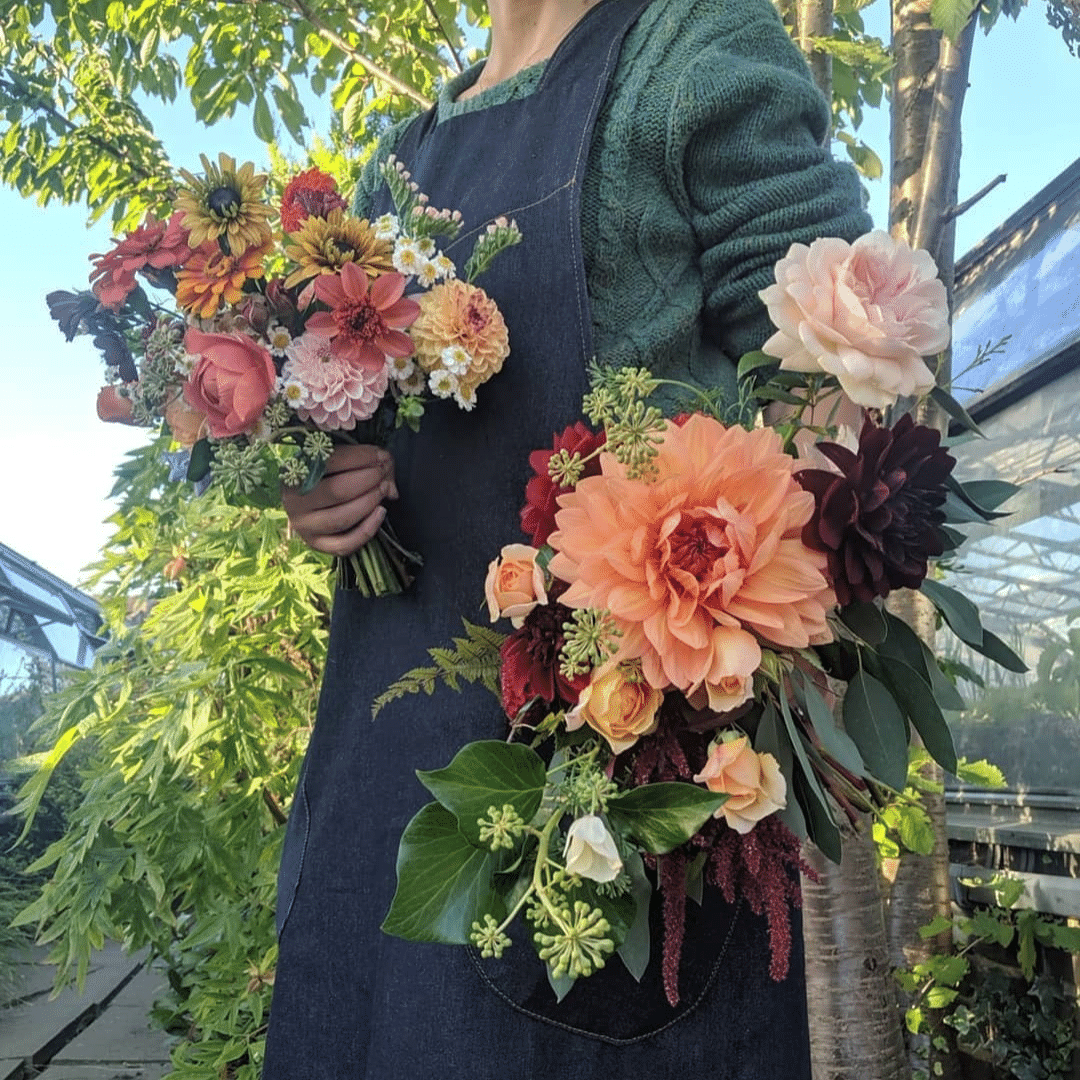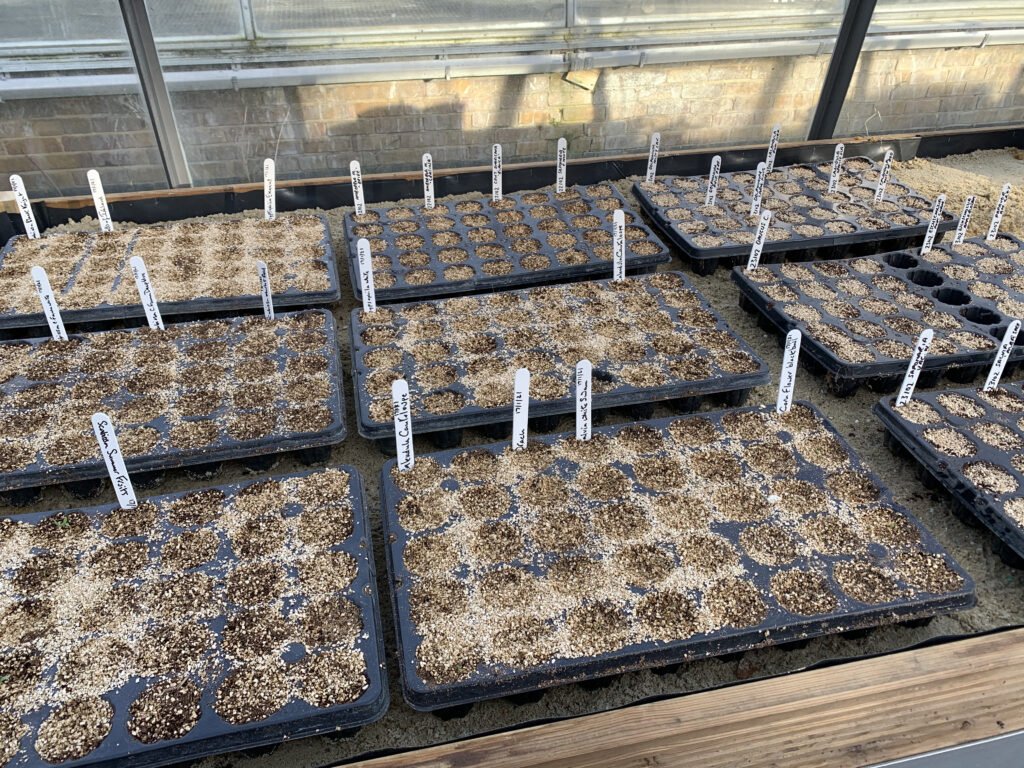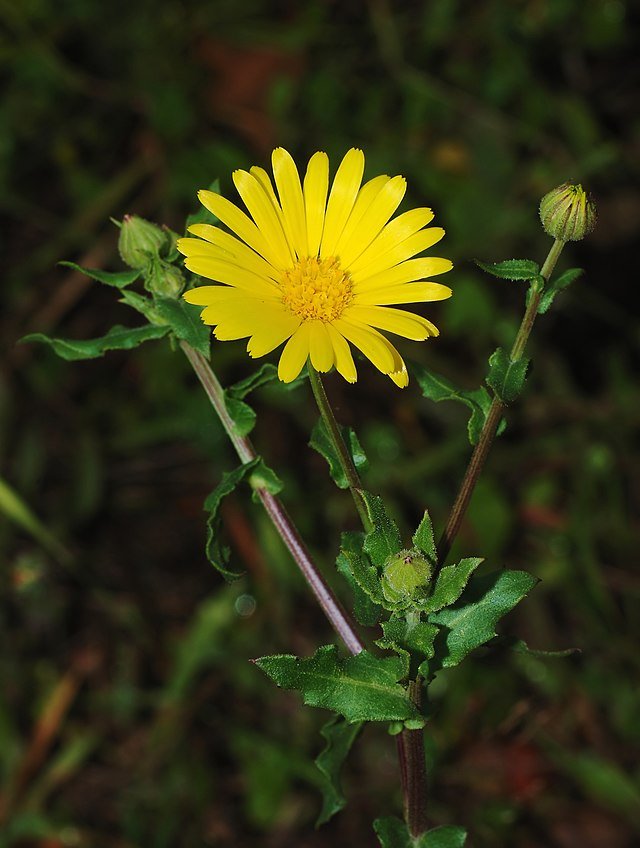NOTES FROM A GROWER
WOLVES LANE & GROWING IN THE CITY
introduction
For anyone running their own business, or thinking of doing so, this is an inspiring story. Two university friends, who after ten years working in jobs that were destroying their energy and outlook, took control and followed their original dream to live ‘The Good Life’.
A new way of life meant everything to both Marianne and Camila, and they never doubted that they would make their dream a success. With this mindset, they continually overcame inevitable obstacles and sought out solutions for every problem.
Now, they are running a thriving, inner city, flower farm with a focus on bio-diversity, organic and no-dig methods as well as helping other growers to grow and create successful flower farms.
background & dreaming
Marianne Mogendorff and Camila Romain became close friends when they were undergraduates at Trinity Hall, Cambridge. During their university days, they would often dream about the “Good Life”, specifically working with flowers.
Post university though, they pursued roles in Production - Camila in Fashion and Marianne in Theatre. Ten years later, exhausted and feeling disillusioned by the intensity of high level project management and frequent travelling, they simultaneously decided to seek a more grounded, nature filled, sustainable work-life.
Utilising their management and production skills, and steadfastly focusing on their initial dream, they were determined to set themselves up as entrepreneurs in the world of flowers.
“Wolves Lane Flower Company provide fresh cut flowers to Londoners, growing seasonal and scented blooms. Sustainability is at the heart of all that Marianne and Camilla do, with locally grown and organic cut flowers delivered across North London ... it is even more special when you know what has been grown was nurtured on a patch of land down the road.”
THE BEGINNING
The first real belief that a career with flowers was possible came from Marianne’s wedding in 2016. Marianne asked family and friends to cut a few flowers from their gardens for the day. Adding extra flowers - to this beautiful, eclectic mix of gifted flowers - from growers Organic Blooms, everyone came together to create a mix of arrangements for the ceremony and celebration.
Shortly after her wedding and with her and Camila’s initial dream becoming more focussed, by chance Marianne discovered that her local council were looking to lease an existing growing plot. The plot was only two streets away from her home, in a busy urban area of North London. It felt like serendipity, and alongside many others, they presented their idea to turn the plot into a flower farm. Despite their lack of experience, with boundless enthusiasm and a focussed dream, they were successfully shortlisted to the final few. Ultimately they missed out - a subsequent blessing in disguise, given the size of the plot - with the space being awarded to Organic Lea, an existing not for profit with a mission to grow affordable vegetables for the local community.
Not being at all disheartened, instead remaining enthusiastic, determined and positively opportunistic, they spoke with Organic Lea and discovered that they didn’t need the entire plot - specifically a derelict, unheated 40m glasshouse and surrounding growing space, amounting to about a third of an acre in total - and they grabbed the chance to takeover this part of the plot!
Photograph credit: Wolves Lane Flower Co.
DIGGING, COMPOST & SOIL
In April 2017, whilst they were still in their current Production roles, Marianne and Camila officially formed Wolves Lane Flower Company. With the growing season already well underway that year, they focussed on improving the soil, a project that spanned the first eighteen months.
Every spare hour outside of work, over weekends and most evenings, and alongside incredible support from family and friends, they moved wheelbarrow after wheelbarrow of compost (mostly from the council’s Eco Compost at the time) and slowly the soil began to come to life again.
As well as a huge investment of their time and energy, they also invested financially into the reconstruction of the greenhouse. As all their spare time was spent on the plot, with minimal time going out, they were able to cover this investment from their existing salaries. It was a brave commitment, as revenue wasn’t forecasted for another year and profit a year following.
I love this determination, it always takes a huge vision and steadfast belief to launch a business. Their focus on that dream alongside a lot of hard work, enabled them to make it happen
VISION & determination
A steadfast belief, strong vision and absolute determination are essential traits for any entrepreneur. It’s this strong vision and determination - in Marianne and Camila’s case, their focus on a more grounded and sustainable way of life - that gave them the belief and confidence to keep going.
There were definitely times when their confidence was shaken and they wondered if they could actually make their dream a reality, but they persisted and worked incredibly hard. Growing is tough, with many highs and lows, but what they were sure of, was that the tide was turning and that florists and consumers were starting to look for a more sustainable and seasonal floristry offering.
With this mindset, they continually overcame inevitable obstacles and sought out solutions for every problem.
In the early days, their original plan was to grow flowers for their own designs, working and establishing themselves as farmer florists. Over the years, although Marianne and Camila enjoy creating and designing for weddings and events, their real passion has become more and more about growing flowers.
This strong desire to focus on farming, has been accompanied by a desire to help and support others with flower farming, specifically with the view of making it more accessible to beginners.
Photograph credit: Garden Museum
advocacy
I meet and speak to many incredible growers, and I am always in awe of the skill, expertise and the energy that it takes to successfully create a thriving flower farm, often on relatively small plots. Speaking to Camila though, what I believe sets Wolves Lane Flower Company apart, is their natural ability to inspire and help other growers, particularly beginners. So I fully understand their focus to help make growing more accessible, to support flower farmers, particularly those in the early stages.
It is very clear that this is their calling, and they are on the absolute right path.
The other wonderful aspect about Camila and Marianne is they openly and happily share each of their failings, each one being an essential lesson, and it has only been through these crucial learnings, that they now have their immensely successful farm, within one of the most unlikely locations in the UK!
learnings & growth
Today they grow a huge number of varieties, there is always room to experiment, to continue their learnings and also to ensure they have rich crops from March to November to maintain a viable business.
It is their belief that by growing more flowers, they become better custodians of the planet. And living in the city, almost outside of nature, this is particularly important to them.
Wolves Lane follow strict organic and no-dig methods, and within only two years, many of the initial issues they were facing, miraculously began to disappear. For example, they were initially plagued by greenfly, but slowly as the soil improved and the varieties of flowers grew, the ladybirds returned and they naturally took care of the pests.
This example was repeated again and again, with incredible success and bounties of extraordinary blooms.
Much of their learnings have come from books – Louise Curley and Georgie Newbery are amongst their favourite authors and experts - and then from trial and error.
“Tuning into the flowering seasons, observing and being compassionate to nature and seeking beauty in the unexpected not only makes us better gardeners but custodians of the planet.”
Photograph credit: The Telegraph
UNSUNG HEROES
In addition to becoming natural advocates for growers, they have also been partly behind the movement in honouring every flower, not just the huge, focal flowers, but in their beautiful words, the “unsung heroes”, the flowers that for many years were considered not worthy for florists’ arrangements; happily our approach to design in floristry is changing. We spoke about removing the hierarchy of flowers, ensuring every stem can be a hero, which I’m fully behind and am a huge advocate of too.
IN PRINT
I was thrilled to learn that they are about to publish their first book. From Camila’s description, it has been created to fulfil their exact goal, to help make growing more accessible, with a focus on supporting those starting out and relatively new to growing. How to Grow the Flowers by Marianne Mogendorff and Camila Romain, is out on 15th September 2022, published by Pavilion Books. It’s available for preorder here.
TO ORDER FLOWERS
Email in the first instance - hello@wolveslaneflowercompany.com
And then pick up, by appointment only - Wolves Lane Horticultural Centre, Wood Green, London N22 5JD.
Read more on their website.
EASIEST FLOWERS TO GROW
I love asking growers about their favourite flowers, and it seemed only right, that instead of asking about one particular variety, I asked Camila if she would please share a list of great annual varieties to grow from seed, specifically for beginners.
Below is her list of the easiest flowers to grow, separated into Hardies (which can be sewn in autumn) and Half Hardies (sewn in spring, to avoid the frosts):
HARDIES (sown autumn/fall & overwintered or in spring):
Calendula
Cornflower
Cerinthe
Corncockle
Cynoglossum
Salvia Viridis
Sweet peas
HALF HARDIES (sown in April)
Sunflowers
Zinnias
Amaranth
Tagetes
Calendula
HARDY - sow autumn/fall & overwintered or in spring
Cornflower
HARDY - sow autumn/fall & overwintered or in spring
Cerinthe
HARDY - sow autumn/fall & overwintered or in spring
Corncockle
HARDY - sow autumn/fall & overwintered or in spring
Cynoglossum
HARDY - sow autumn/fall & overwintered or in spring
Salvia Viridis
HARDY - sow autumn/fall & overwintered or in spring
Sweet Peas
HARDY - sow autumn/fall & overwintered or in spring
Sunflowers
HALF HARDY - sow in spring
Zinnias
HALF HARDY - sow in spring
Amaranth
HALF HARDY - sow in spring
Tagetes (Marigolds)
HALF HARDY - sow in spring
british growers
And if you are a florist in the UK, looking for local growers who grow on relative scale, Camila and Marianne kindly put the following list together of other growers they admire enormously and who could probably supply in larger quantities (specifically for weddings and events):
Aweside Farm, East Sussex
Bayntun Flowers, West Wiltshire
Black Shed Flower Farm, Dorset
Carol Siddorn, Cheshire
Electric Daisy Flower Farm, Somerset
Forever Green Flower Company, North Norfolk
Green and Gorgeous, Oxfordshire
Lakes & Rivers Flower Farm, Liverpool
London Flower Farmer, Walthamstow, London
Mill Pond Flower Farm, Berwickshire
Organic Blooms, South Gloucestershire
Plant Passion, Surrey
Ravenshill Flower Farm, West Gloucestershire
The Rowan Tree, Glamorgan
Water Lane - Kent/East Sussex
West End Flower Farm, Hampshire
Photograph credit: Wolves Lane Flower Co.




























